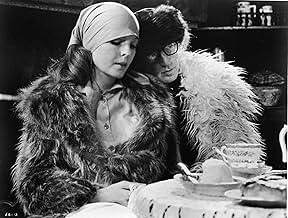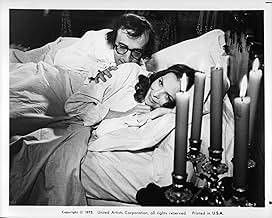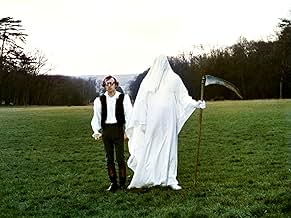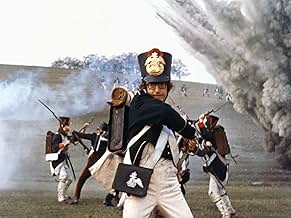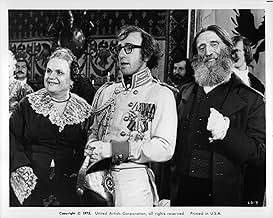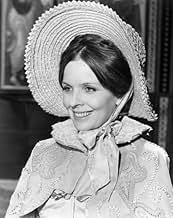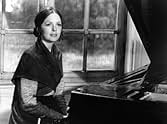In czarist Russia, a neurotic soldier and his distant cousin formulate a plot to assassinate Napoleon.In czarist Russia, a neurotic soldier and his distant cousin formulate a plot to assassinate Napoleon.In czarist Russia, a neurotic soldier and his distant cousin formulate a plot to assassinate Napoleon.
- Awards
- 1 win & 1 nomination total
Féodor Atkine
- Mikhail
- (as Feodor Atkine)
Yves Barsacq
- Rimsky
- (as Yves Barsaco)
Gérard Buhr
- Servant
- (as Gerard Buhr)
Henri Czarniak
- Ivan
- (as Henry Czarniak)
- Director
- Writer
- All cast & crew
- Production, box office & more at IMDbPro
Featured reviews
Watching Love And Death today I had the feeling that back when Woody Allen was going to Midwood High School in Brooklyn, a few years before I did, he was forced to do a book report on War And Peace and hated it. He vowed to get even with Tolstoy and all the rest of those heavy Russian dramatists and in Love And Death I do believe he succeeded.
And if you ever were forced to sit through all that turgid prose and heavy dramatics than Love And Death is the film you've longed for. The time is the Napoleonic Wars and the flower of Russian manhood is answering the colors. But Woody comes from a different patch than the other flowers bloomed in and he's not that crazy about sacrificing for old mother Russia.
The overall tone of Love And Death is a homage to Groucho Marx and years earlier I could have seen the Marx Brothers doing something like Love And Death with a bit more creative control, just like what Woody Allen has with his movies. But the military scenes were out of the Bob Hope school of cowardice playbook.
Lest anyone think that only Russian literature got a good satire, Allen includes a take off on Eugene O'Neill's Strange Interlude as Allen and Diane Keaton both go into those stage soliloquys about what the future holds for them as a couple.
Love And Death a must for Woody Allen and a missionary film for those looking to convert someone to being a Woody Allen fan.
And if you ever were forced to sit through all that turgid prose and heavy dramatics than Love And Death is the film you've longed for. The time is the Napoleonic Wars and the flower of Russian manhood is answering the colors. But Woody comes from a different patch than the other flowers bloomed in and he's not that crazy about sacrificing for old mother Russia.
The overall tone of Love And Death is a homage to Groucho Marx and years earlier I could have seen the Marx Brothers doing something like Love And Death with a bit more creative control, just like what Woody Allen has with his movies. But the military scenes were out of the Bob Hope school of cowardice playbook.
Lest anyone think that only Russian literature got a good satire, Allen includes a take off on Eugene O'Neill's Strange Interlude as Allen and Diane Keaton both go into those stage soliloquys about what the future holds for them as a couple.
Love And Death a must for Woody Allen and a missionary film for those looking to convert someone to being a Woody Allen fan.
"Love and Death" is one of my favourite Woody Allen films, right up there with "Manhattan," "Crimes and Misdemeanors" and "Deconstructing Harry." Sure, the jokes are scattershot and don't always work, but when they do the film is a gut-buster. ("A tremendous amount of wheat!") Parodying everything from Russian literature to foreign films (especially those of his beloved Ingmar Bergman), it's also one of Allen's most overtly philosophical films with characters breaking into syllogisms and formal arguments at the most unlikely moments. Students of philosophy should get a kick out of it.
That said, it is accessible to just about anybody. Almost nobody does fish-out-of-water comedy as well as Woody Allen (see also "Bananas" and "Sleeper"), and Diane Keaton shines as usual as the promiscuous object of his desire. And look for Jessica Harper in a small role as the cousin who rattles off a convoluted list of romantic entanglements worthy of Chekhov.
This was the last step of Allen's formative period. After this, his films would get a lot more focused.
That said, it is accessible to just about anybody. Almost nobody does fish-out-of-water comedy as well as Woody Allen (see also "Bananas" and "Sleeper"), and Diane Keaton shines as usual as the promiscuous object of his desire. And look for Jessica Harper in a small role as the cousin who rattles off a convoluted list of romantic entanglements worthy of Chekhov.
This was the last step of Allen's formative period. After this, his films would get a lot more focused.
This Woody Allen flick is by far the funniest of his that I have seen thus far, although i don't think its as good as a film as Annie Hall or The Purple Rose of Cairo, both which I consider masterpieces of Woody's, Love and death is still a brilliant film. The story of Boris Grushenko (Allen), a Russian who is caught up in the invasion of the french lead by Napoleon (Tolkan). Meanwhile he also loves Sonja (Keaton), a girl who has confusions of her own. The film is written brilliantly, great dialogues and wit, its truly offbeat humor, the funniest from Woody. Although his direction here is a bit weird, and at times the plot is not believable at all and obviously satirical, the performances and great dialogues make it work. It was a bit redundant and had a bit too much slapstick at times but still enjoyable. Watching this film, truly had me laughing throughout. Woody was perfect in his role, probably my favorite acting from him along with his acting in Annie Hall. Diane Keaton was also great here, not as good as her other work in this decade (GF, GF2 and Annie Hall), however still great here. James Tolkan was also great as Napoleon. 9/10 #91 on list of all time favorite films
One of the funniest movies of all time. The War & Peace and Chekov slant gives it a great feel. Allen and Keaton are at their best, and funnier than Grace & Burns, Hepburn & Tracey, etc..
One of the better lines, "To love is to suffer. To avoid suffering one must not love, but then one suffers from not loving. Therefore, to love is to suffer, not to love is to suffer, to suffer is to suffer. To be happy is to love, to be happy then is to suffer but suffering makes one unhappy, therefore to be unhappy one must love or love to suffer or suffer from too much happiness. I hope you're getting this down."
This classic comedy is very rarely known, and worth watching it over and over.
One of the better lines, "To love is to suffer. To avoid suffering one must not love, but then one suffers from not loving. Therefore, to love is to suffer, not to love is to suffer, to suffer is to suffer. To be happy is to love, to be happy then is to suffer but suffering makes one unhappy, therefore to be unhappy one must love or love to suffer or suffer from too much happiness. I hope you're getting this down."
This classic comedy is very rarely known, and worth watching it over and over.
When Napoleon invades the Russian Empire during the Napoleonic wars, Boris Grushenko (Woody Allen), a "militant coward" and pacifist scholar, is forced to enlist in the Russian Army, desperate and disappointed hearing the news that his cousin Sonja (Diane Keaton) is to wed a herring merchant.
The film is full of philosophical and pseudo-philosophical commentary. In one instance, a priest suggests that Spinoza proves God's existence. Boris and Sonja banter back and forth about epistemology and such, and only once does Sonja really offer any advice worth taking in: that "to love is to suffer and to not know love is to suffer", which really amounts to little more than "life is suffering", something the Buddhists or Schopenhauer would have embraced.
But then again, you have wise men spouting off silliness, including the view that German Jews have stripes, and Russian Jews have horns. We are left to conclude, as Boris quickly does, that being logical in an illogical world is a complex and unfavorable situation.
It has been said that the use of Sergei Prokofiev for the soundtrack adds to the Russian flavor of the film. Other parts referencing Russian culture include a dialogue between Boris and his father with each line alluding to or being composed entirely of Dostoevsky titles. This is crucial to really get the point of how backwards everything was across.
I was not able to fully appreciate the film because I am ignorant of its references to the works of Bergman (notably "Persona" and "Smiles of a Summer Night"). But that is true of much of Allen's work, I think. His constant references to Dostoevsky did reach me but may have been missed by others. Yet, even if few completely "get" the picture, it remains beautiful and humorous just the same. Allen has called this his favorite picture, even more so than "Annie Hall". I have to see more to be sure, but as of now I am inclined to agree.
The film is full of philosophical and pseudo-philosophical commentary. In one instance, a priest suggests that Spinoza proves God's existence. Boris and Sonja banter back and forth about epistemology and such, and only once does Sonja really offer any advice worth taking in: that "to love is to suffer and to not know love is to suffer", which really amounts to little more than "life is suffering", something the Buddhists or Schopenhauer would have embraced.
But then again, you have wise men spouting off silliness, including the view that German Jews have stripes, and Russian Jews have horns. We are left to conclude, as Boris quickly does, that being logical in an illogical world is a complex and unfavorable situation.
It has been said that the use of Sergei Prokofiev for the soundtrack adds to the Russian flavor of the film. Other parts referencing Russian culture include a dialogue between Boris and his father with each line alluding to or being composed entirely of Dostoevsky titles. This is crucial to really get the point of how backwards everything was across.
I was not able to fully appreciate the film because I am ignorant of its references to the works of Bergman (notably "Persona" and "Smiles of a Summer Night"). But that is true of much of Allen's work, I think. His constant references to Dostoevsky did reach me but may have been missed by others. Yet, even if few completely "get" the picture, it remains beautiful and humorous just the same. Allen has called this his favorite picture, even more so than "Annie Hall". I have to see more to be sure, but as of now I am inclined to agree.
Did you know
- TriviaIn an interview with 'Esquire' magazine, Woody Allen once said of the making of this movie: "When good weather was needed, it rained. When rain was needed, it was sunny. The cameraman was Belgian, his crew French. The underlings were Hungarian, the extras were Russian. I speak only English - and not really that well. Each shot was chaos. By the time my directions were translated, what should have been a battle scene ended up as a dance marathon. In scenes where Keaton and I were supposed to stroll as lovers, Budapest suffered its worst weather in twenty-five years".
- GoofsThe young Boris has blue eyes, but the adult Boris has brown eyes.
- Quotes
Sonja: To love is to suffer. To avoid suffering one must not love. But then one suffers from not loving. Therefore, to love is to suffer; not to love is to suffer; to suffer is to suffer. To be happy is to love. To be happy, then, is to suffer, but suffering makes one unhappy. Therefore, to be unhappy, one must love or love to suffer or suffer from too much happiness. I hope you're getting this down.
- Crazy creditsRussian composer Sergei Prokofiev is listed in the credits as "S. Prokofiev," just the way he would have been listed in the credits of a Russian film.
- Alternate versionsThe MGM DVD release deletes the pre-title Prokofiev overture.
- ConnectionsFeatured in V.I.P.-Schaukel: Episode #7.3 (1977)
Details
- Release date
- Country of origin
- Official site
- Language
- Also known as
- Die letzte Nacht des Boris Gruschenko
- Filming locations
- Production company
- See more company credits at IMDbPro
Box office
- Budget
- $3,000,000 (estimated)
- Gross US & Canada
- $20,123,742
- Gross worldwide
- $20,123,742
Contribute to this page
Suggest an edit or add missing content


